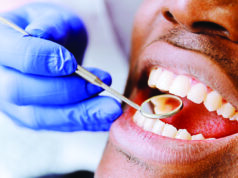Is herbal medicine effective in treating sexual and reproductive health illnesses?
Lately, the health is getting jam-packed with all sorts of herbal medicine. Majorly, the herbal concoctions are believed to treat illnesses related to sexual and reproductive health issues like fibroids, sperm quality, cysts, gender selection, blocked fallopian tubes, libido and many more AGNES KASEMIIRE talked to fertility experts and herbalists to explore the effectiveness and dangers associated with herbal medicines
Joan Birabwa’s story
Joan Birabwa, 50, recalls she failed to conceive immediately after her wedding in 2000. With advice from friends and relatives, Birabwa resorted to using herbal medicine but still did not conceive after six years.
“I was having my menstruation periods normally, in addition to regular sexual intercourse but still I did not conceive,” Birabwa narrates her ordeal.
Having lost hope, in 2007, her friend advised her to go and consult with Dr Edward Tamale-Sali of Women’s Hospital International and Fertility Center in Bukoto (WHI&FC).

She adds: “After consultation and examination by Dr Sali, the results indicated that I needed to start on medication. I was also advised to stop using any other medication including herbal.”
The doctor asked Birabwa to go along with her husband for thorough medical examination including doing abdominal ultra-sound scan. The results indicated that her spouse did not have any fertility problem.
Dr Sali later explained that she had ovulation disorders and had few eggs available for fertilization
In 2010, Dr Sali decided to put her on In-Vitro Fertility (IVF) treatment. During IVF, an egg is removed from the woman’s ovaries and fertilized in the laboratory. The fertilized egg, called embryo, is then transferred to the woman’s womb to grow and develop into a baby.
After two failed attempts, Birabwa conceived in March 2018 and delivered twins through C-section. The babies are healthy and grown.

Fertility experts speak out
Dr Gonzaga Andabati, a fertility specialist at Bethany Women and Family Hospital based in Luzira, acknowledges that many people in Uganda, who are battling with reproductive health issues including fibroids, low sperm count and infertility, use or have used herbal medicine at one point. He says that 10-15 percent of couples in Uganda struggle to have children due to infertility issues.
Dr Andabati cautions that although people prefer to use herbal medicine, the practice heavily impacts on health and finances, yet it never yields results.
He says that although some Chinese medical products are extracted from plants, the medicine active ingredients, mechanisms of action and appropriate doses should be scientifically assessed. He adds that most of the locally produced herbs are not certified by Uganda National Bureau of Standards (UNBS) and this poses significant risks and side effects due to over dosing.
Dr Elizabeth Nakiyinji, a medical officer in the gynecology and obstetrics department at (WHI&FC) agrees with Andabati. Nakiyinji faults people who resort to using herbal medicine before carrying out medical tests to know the cause of the problem.
“If the health condition is blocked fallopian tubes or uterus, it does not matter how much of herbal medicine you take; if professional diagnosis is not done, the problem will not be dealt with,” she says.
Additionally, she points out cases where couples waste a lot of time on herbal medicines and by the time they seek professional medical treatment, the women have hit menopause and can no longer conceive naturally or their health condition has worsened.
She says: “Take an example of fibroids; if not treated early, they grow bigger in size, causing other complications such as pain and heavy bleeding.”
Clinical records at (WHI&FC) reveal that most women who use herbal medicine to treat sexual and reproductive health issues end up developing ovarian cysts.
Dr Nakiyinji suspects that since the herbal medicines are unregulated and tested, they lack proper dosage. Consequently, these may cause over stimulation of ovaries and the individual ends up developing cysts.
She advises people battling with all sorts of conditions to always seek medical help instead of resorting to herbal medicine.
Herbal medicine experts
Jane Nyamwiza, a resident of Kibingo, Mbarara district, has been treating women with reproductive issues for 22 years. She strongly approves of herbal therapy, saying that it has helped some of her clients.
“I boil several herbs and make concoctions for women who cannot conceive due to anemia, blocked fallopian tubes or even those with issues of the uterus, and they respond to the treatment very well,” Nyamwiza says.
When asked about the efficacy of the herbal treatment, she responds assertively: “If the treatment was not working, why would the women keep coming back or referring their friends?”
How does herbal medicine work?
Mauda Kamatenesi, a Professor in herbal medicine, agrees with Nyamwiza. She saysthat some herbal medicine is made from vegetables or spices that contain both nutritional and medicinal properties.
She says concoctions made from spices such as ginger, garlic and honey are popular for treating sexually transmitted infections like candidiasis which are a major cause of blocked fallopian tubes. Some herbal concoctions that are used to treat anemia are made from vegetables such as beetroot which contains Iron properties that alleviate anemic levels.
According to Prof Kamatenesi, such herbal concoctions are not harmful because they are consumed as food.
In addition, some plants have medicinal properties that treat health conditions caused by hormonal imbalance. She explains that some herbs regulate hormones.
“For example, some herbs have capacity to stabilize irregular menstrual cycle caused by hormonal imbalance. As such, a woman is able to conceive once the hormones in the body are regulated and the reproductive system starts functioning properly,” Kamatenesi says.
She adds that some herbal medicine is effective in treating majorly secondary infertility. Secondary infertility is the inability to become pregnant or carry a pregnancy successfully after previous success in delivering a child.
She says: “It is very difficult to treat someone who was born infertile, whether it is the ovaries that are not viable or producing sperm in the semen. She terms this as primary infertility. In this case, the individual would require donated ovaries or sperm to have children; hence, requiring specialists in fertility issues.
Moving forward
Dr Andabati says if the herbs are to be effective in treating diseases, including the sexual and reproductive health diseases, proper scientific assessment should be done to determine their effectiveness and safety in terms of dosage.
Similarly, Prof Kamatenesi recommends research to be done.
“The plants or herbs should be studied and the dosage standardized. Someone taking the traditional medicine should know its active chemical properties and the dosage should be indicated,” she says.






















